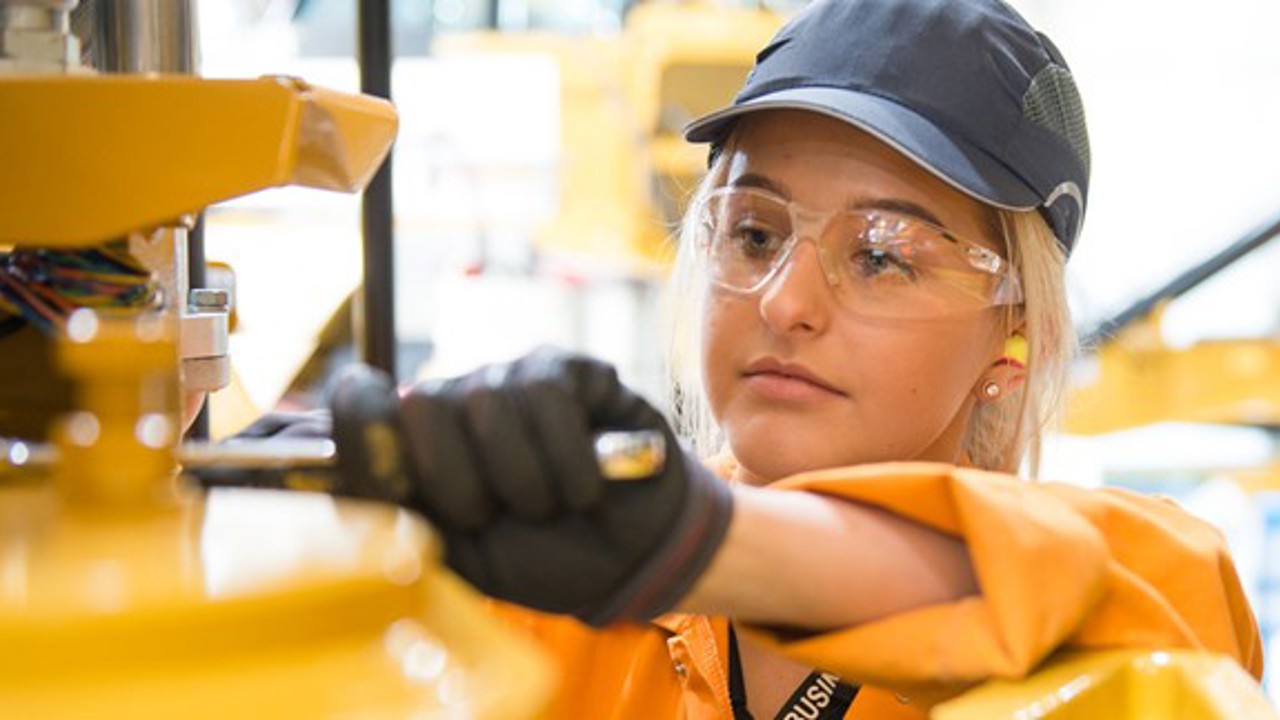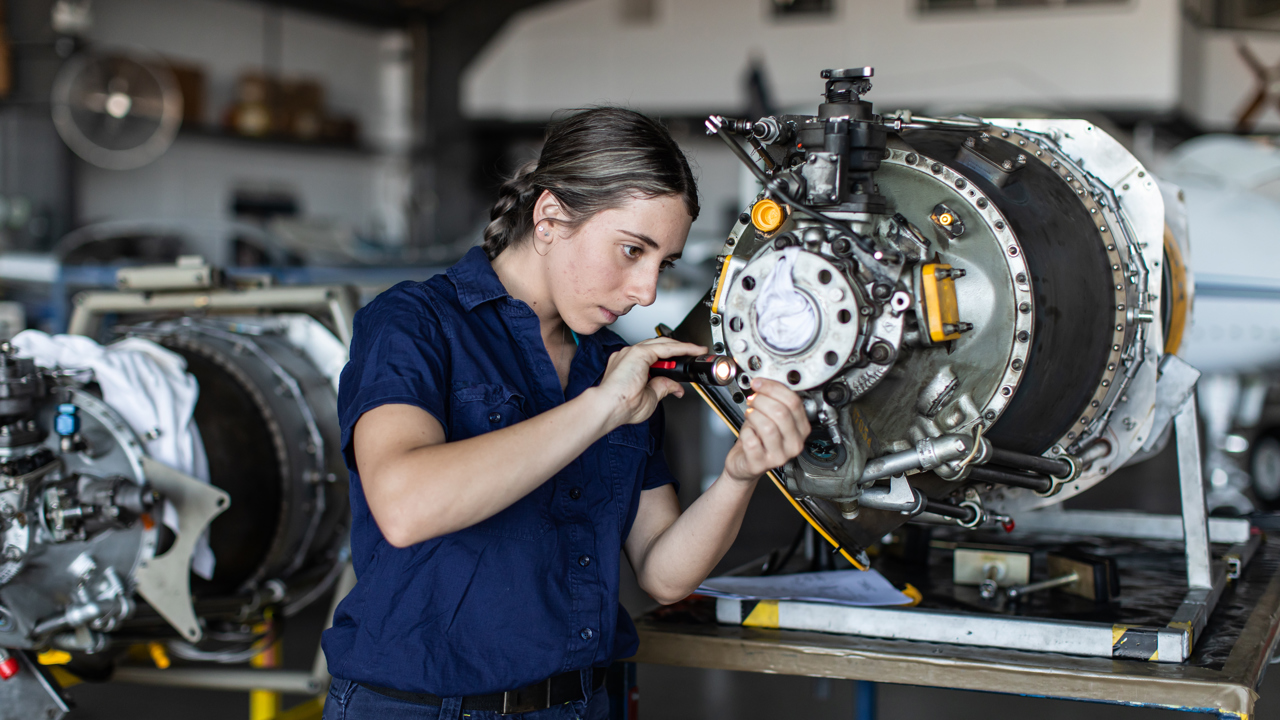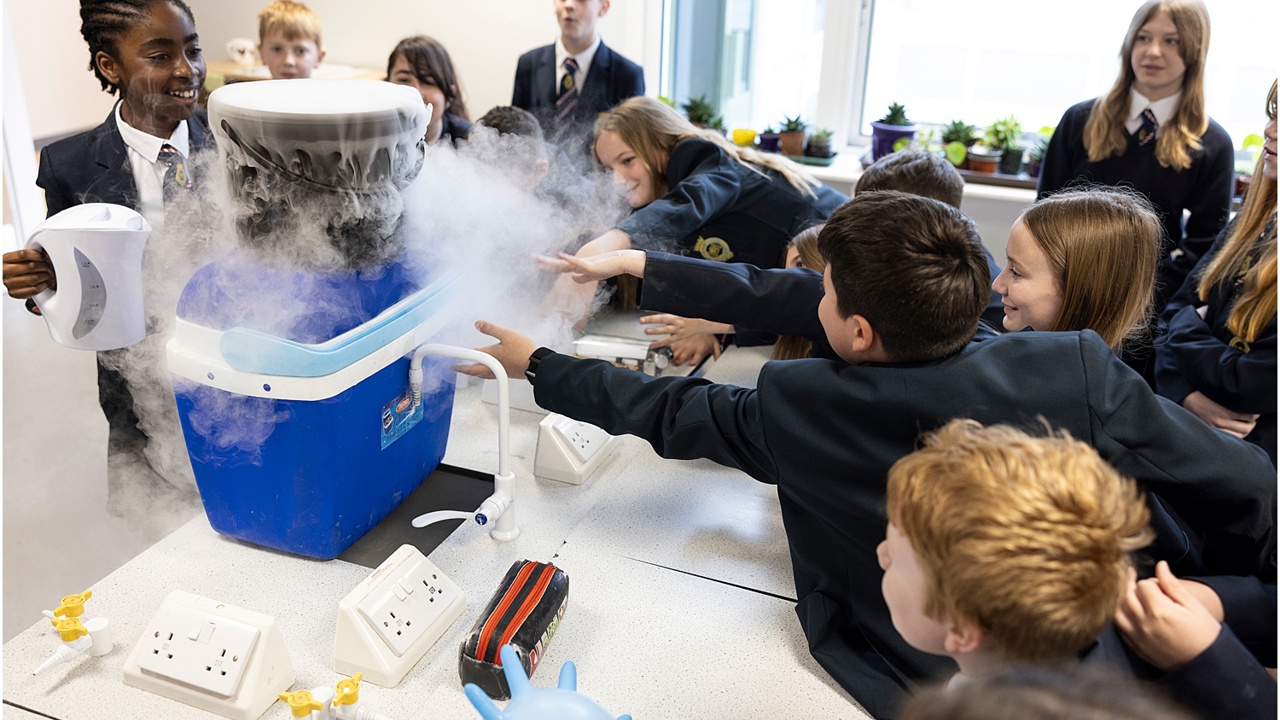
Infographic dashboards
Engineering and technology workforce
- 6.4 million people work in engineering and technology jobs in the UK, that’s 19% of all jobs Engineering and technology workforce - May 2025 update
- Engineering and technology jobs predicted to grow in all UK regions between now and 2030 faster than other occupations Engineering skills needs – now and into the future
- 25% of all job adverts are for engineering and technology roles Engineering skills needs – now and into the future
- 1 in 5 jobs in the UK are in engineering, yet engineering vacancies account for 1 in 4 adverts Engineering skills needs – now and into the future
- 48% increase in job adverts mentioning ‘green skills’ Engineering skills needs – now and into the future
- 55% increase in job adverts for ‘green engineering jobs’ Engineering skills needs – now and into the future
- Up to 725k net jobs are needed to support the transition to net zero A net zero workforce (Climate Change Committee)
- 16.9% of the workforce in engineering and technology are women vs. 56% in other occupations Engineering and technology workforce - May 2025 update
- 14% of the workforce in in engineering and technology are disabled vs 19% in other occupations Engineering and technology workforce - May 2025 update
- 14% are from a minority ethnic background compared to 18% in other occupations Engineering and technology workforce - May 2025 update
- Occupation and industry UK workforce breakdown Engineering and technology workforce - May 2025 update
- 13% working as an engineer in the engineering and technology industry
- 10% working in the engineering and technology industry but not as an engineer
- 6% working as an engineer in a different sector
- 71% neither working as an engineer nor in the engineering and technology industry
- Regional distributions and geographical specialisms Engineering skills needs – now and into the future
- Young people’s interest in STEM careers Science Education Tracker 2023
- Science: 44% girls, 47% boys
- Technology: 23% girls, 52% boys
- Engineering: 29% girls, 63% boys
- Maths: 32% girls, 45% boys
- 83% of students were more interested in engineering jobs because of The Big Bang Fair The Big Bang Fair evaluation
- 31% of students were more interested in science, engineering and tech because of The Big Bang Fair The Big Bang Fair evaluation
- 19% of students were more interested in engineering careers because of Energy Quest Energy Quest evaluation
Transition to net zero
- 6.4 million people work in engineering and technology jobs in the UK Engineering and technology workforce - May 2025 update
- 25% of all job adverts are for engineering and technology roles Engineering skills needs – now and into the future
- 48% increase in job adverts mentioning ‘green skills’ Engineering skills needs – now and into the future
- 55% increase in job adverts for ‘green engineering jobs’ A net zero workforce (Climate Change Committee)
- 77% of students agreed that The Big Bang Fair had shown them solutions to environmental problems The Big Bang Fair evaluation
- 71% of students said that Energy Quest had taught them about the role engineers play in developing technologies for renewable energy sources Energy Quest evaluation
- Projected new jobs in net zero workforce Net zero workforce
- Top 3 environmental topics young people are interested in Science Education Tracker 2023
- 42% climate change
- 31% biodiversity loss
- 22% air pollution
- Gender breakdown of young people’s interest in the environment Science Education Tracker 2023
- Girls: 47% climate change, 37% biodiversity loss, 21% sustainable fashion
- Boys: 38% climate change, 24% biodiversity loss, 21% transport
- 64% of young people are interested in climate change issues Science Education Tracker 2023
- 35% of young people are interested in a career that will help reduce the impact of climate change Science Education Tracker 2023
Women in engineering
- 16.9% of the engineering and technology work force are women, compared with 56.2% in other occupations Engineering and technology workforce - May 2025 update
- A higher proportion of women working in engineering and technology (21%) are from UK minority ethnic backgrounds compared to other occupations (17%) Engineering and technology workforce - May 2025 update
- Girls’ top 3 environmental sustainability topics Science Education Tracker 2023
- 47% climate change
- 37% biodiversity loss
- 21% sustainable fashion
- Young people’s interest in STEM careers Science Education Tracker 2023
- Science: 44% girls, 47% boys
- Technology: 23% girls, 52% boys
- Engineering: 29% girls, 63% boys
- Maths: 32% girls, 45% boys
- Proportion of girls making up GCSE students by subject GCSE results 2024
- Maths 50%
- Physics 48%
- Computing 22%
- D&T 31%
- Proportion of girls making up A level students by subject A level results 2024
- Maths 37%
- Physics 23%
- Computing 17%
- D&T 32%
- 12% of girls say being an engineer fits well with who they are compared with 38% of boys Science Education Tracker 2023
- Interest in schools science for girls has declined since 2019 75% to 65%, while boys have remained consistent Science Education Tracker 2023
- 36% of girls say science is not for them compared with 30% of boys Science Education Tracker 2023
- Just 16% of girls think engineering is suitable for them compared with 44% boys Science Education Tracker 2023
- 18% of students starting undergraduate engineering degrees are women, compared to 56% across all subjects Engineering in higher education
- Proportion of first year engineering undergraduates who are female by engineering subject Engineering in higher education
- Aeronautical and aerospace engineering – 14%
- Chemical, process and energy engineering – 29%
- Civil engineering – 22%
- Electronic and electrical engineering – 14%
- General engineering – 21%
- Mechanical engineering – 12%
- Production and manufacturing engineering – 11%
- 9% of engineering T Levels entries were girls, compared to 44% across all subjects T Level results 2024
- 17% of engineering apprenticeship starts were by women, compared to 52% across all subjects Apprenticeship pathways into engineering 2023/24
Diversity
- 6.4 million people work in engineering and technology jobs in the UK Engineering and technology workforce - May 2025 update
- 16.9% of the workforce in engineering and technology are women vs. 56% in other occupations Engineering and technology workforce - May 2025 update
- 14% of the workforce in in engineering and technology are disabled vs 19% in other occupations Engineering and technology workforce - May 2025 update
- 14% of the workforce are from a minority ethnic background compared to 18% in other occupations Engineering and technology workforce - May 2025 update
- 14% of engineering and tech apprenticeship starts are from UK minority ethnic students vs. 16% across all subjects Apprenticeship pathways into engineering 2024/24
- Young people’s interest in STEM careers Science Education Tracker 2023
- Science: 44% girls, 47% boys
- Technology: 23% girls, 52% boys
- Engineering: 29% girls, 63% boys
- Maths: 32% girls, 45% boys
- 12% of girls say being an engineer fits well with who they are compared with 38% of boys Science Education Tracker 2023
- Interest in schools science for girls has declined since 2019 75% to 65%, while boys have remained consistent Science Education Tracker 2023
- 36% of girls say science is not for them compared with 30% of boys Science Education Tracker 2023
- Just 16% of girls think engineering is suitable for them compared with 44% boys Science Education Tracker 2023
- 9% of engineering T Levels entries were girls T Level results 2024
- 17% of engineering apprenticeship starts were by women Apprenticeship pathways into engineering 2023/24
- 18% of students starting undergraduate engineering degrees are women Engineering in higher education
- Proportion of girls making up GCSE students by subject GCSE results 2024
- Maths 50%
- Physics 48%
- Computing 22%
- D&T 31%
- Proportion of girls making up A level students by subject A level results 2024
- Maths 37%
- Physics 23%
- Computing 17%
- D&T 32%
- Proportion of students saying that engineering is not for them, by ethnicity Science Education Tracker 2023
- White 35%
- Mixed ethnicity 30%
- Black 26%
- Asian 22%
- SEND students are equally interested in science at school compared to non-SEND students, but less interested in a science career (39% vs. 48%) Science Education Tracker 2023 addendum
- SEND students are equally interested in an engineering career (47%), and are more interested in a tech career (43% vs. 37%) Science Education Tracker 2023 addendum
- SEND students are less likely to think they are good at science (40% vs. 51% non-SEND) Science Education Tracker 2023 addendum
- Students eligible for free school meals (FSM) less likely to think they are good at science (44% vs. 51% non-FSM) Science Education Tracker 2023 addendum
Knowledge and perceptions
Young people
- 72% think engineering is a career that allows people to be creative Science Education Tracker 2023
- 36% say they know a fair amount about what engineers do Science Education Tracker 2023
- 32% say they know a fair amount about what those working in tech do Science Education Tracker 2023
- 35% are interested in a career that will help reduce the impact of climate change Science Education Tracker 2023
- 64% are interested in climate change issues Science Education Tracker 2023
- 46% interested in an engineering career Science Education Tracker 2023
- 38% interested in a tech career Science Education Tracker 2023
- 25% think engineering fits well with who they are Science Education Tracker 2023
- 12% of girls say being an engineer fits well with who they are compared with 38% of boys Science Education Tracker 2023
- 30% think engineering is suitable for them Science Education Tracker 2023
- 16% of girls think engineering is suitable for them compared with 44% boys Science Education Tracker 2023
- 36% of girls say science is not for them Science Education Tracker 2023
- Young people’s interest in STEM careers Science Education Tracker 2023
- Science: 44% girls, 47% boys
- Technology: 23% girls, 52% boys
- Engineering: 29% girls, 63% boys
- Maths: 32% girls, 45% boys
- 79% of The Big Bang Fair attendees said they knew more about what engineers do after The Fair. 75% wanted to find out more about STEM jobs. 65% were inspired to consider a job in STEM The Big Bang Fair evaluation
- 21% of students said Energy Quest motivated them to find out more about engineering jobs Energy Quest evaluation
- Young people interested in an engineering career prefer a technical or vocational route (36%) compared to a university route (28%) Science Education Tracker 2023
- More interested in a technical or vocational route: 40% Boys, 40% white students
- More interested in a university route: 38% Girls, 44% Asian students
Teachers
- Teachers are equally likely to recommend an apprenticeship or university route (36%), another technical/vocational route (4%) School report
- 53% feel confident advising their students of vocational and technical pathways into engineering School report
- 85% of STEM teachers recommend a career in engineering School report
- 92% said engineering is important or very important in the UK achieving net zero by 2050 School report
- 76% delivering Big Bang at School said it made them more confident to speak to students about STEM careers Big Bang at School evaluation
- 82% said it motivated them to suggest STEM careers to students Big Bang at School evaluation
STEM in school
- Interest in school science among years 7 to 9 has declined from 76% to 71%. For girls, the decline is 75% to 65% Science Education Tracker 2023
- Year 7 to 9 students are less confident in their abilities compared to 2019 Science Education Tracker 2023
- 49% think they are good at science, down from 56%
- 43% think they are good at computing, down from 50%
- 8 in 10 STEM teachers have delivered STEM outreach in the last year School report
- Barriers to delivering more STEM outreach: 52% Funding, 49% Time School report
- Main motivations for years 7 to 9 studying science Science Education Tracker 2023
- Doing practical work 52%
- Having a good teacher 36%
- Finding science interesting 32%
- Main discouragements for years 7 to 9 studying science Science Education Tracker 2023
- Finding it difficult 40%
- It’s a lot to learn and/or remember 37%
- Don’t find some topics interesting 34%
- Main motivations for years 7 to 9 studying computing Science Education Tracker 2023
- Find it creative 27%
- Finding it interesting 24%
- Having a good teacher 18%
- But 43% of girls say nothing has encouraged them, compared to 27% of boys
- Main discouragements for years 7 to 9 studying computing Science Education Tracker 2023
- Not interesting 30%
- Can be difficult 28%
- Doesn’t fit with future plans 21%
- But 43% of girls say nothing has encouraged them, compared to 27% of boys
- GCSE students doing hands-on practical work at least once a fortnight is declining – from 44% in 2016 to 26% in 2023 Science Education Tracker 2023
- Watching a video of a practical fortnightly has risen from 26% to 46% since 2016 Science Education Tracker 2023
- Top 3 barriers for teachers delivering practicals School report
- The demands of delivering the curriculum 44%
- Difficult to schedule due to time 37%
- Student behaviour 33%
- 43% of young people report doing a STEM extracurricular activity in the last year Science Education Tracker 2023
- Careers fair 17%
- Talk at school 15%
- School club 12%
Educational pathways into engineering and technology
- Young people interested in an engineering career prefer a technical or vocational route (36%) compared to a university route (28%) Science Education Tracker 2023
- More interested in a university route:
- 38% Girls
- 44% Asian students
- More interested in a technical or vocational route:
- 40% Boys
- 40% white students
- More interested in a university route:
- Top 3 reasons young people are interested in a technical or vocational route Science Education Tracker 2023
- To start earning money straight away 48%
- Prefer to learn by doing things 48%
- Engineering is practical and well suited to on-the-job learning 46%
- Top 3 reasons young people are interested in a university route Science Education Tracker 2023
- To keep career options more open 54%
- A degree would lead to better paid jobs in the long run 53%
- To have the experience of going to university 53%
- Teachers are equally likely to recommend an apprenticeship or university route (36%), and less likely to recommend another technical/vocational route (4%) School report
- 53% feel confident advising their students of vocational and technical pathways into engineering School report
- 85% of STEM teachers recommend a career in engineering School report
- 83% of teachers say they know what subjects their students would need to take to have a career in engineering School report
- Top 3 reasons STEM teachers would recommend a technical or vocational route into engineering: School report
- If they prefer to learn by doing rather than being in a classroom 54%
- Engineering is practical and well suited to on-the-job learning 52%
- To avoid high student fees and/ or debt 50%
- Top 3 reasons STEM teachers would recommend a university route into engineering: School report
- To keep career options more open 71%
- They might need a degree to get promoted or progress 48%
- Better for their personal development 39%
- 89% of STEM teachers in England are aware of T Levels, but only 11% say their school or college offers T Level School report
- Parent knowledge of different education/ training routes: PARENTS REPORT TO BE PUBLISHED
- Know a lot:
- University 42%
- Apprenticeships 20%
- Other vocational 15%
- BTECs 12%
- T Levels 5%
- Know a little:
- University 40%
- Apprenticeships 60%
- Other vocational 54%
- BTECs 47%
- T Levels 23%
- Know a lot:
Key subject uptake
- Entries into key GCSE subjects and proportion of all entries: GCSE results 2025
- Double science – 989,264 (16.1%)
- Maths – 893,198 (14.5%)
- Chemistry – 174,088 (2.8%)
- Physics – 173,227 (2.8%)
- Computing – 91,619 (1.5%)
- Design & technology – 86,307 (1.4%)
- Engineering – 2,476 (0%)
- Entries into key National 5 subjects and proportion of all entries: National 5 results 2025
- Maths – 34,775 (10.4%)
- Chemistry – 15,210 (4.6%)
- Physics – 13,680 (4.1%)
- Practical woodworking – 9,040 (2.7%)
- Computing science – 6,585 (2%)
- Design and manufacture – 3,990 (1.2%)
- Entries into key A level subjects and proportion of all entries: A level results 2025
- Maths – 112,138 (12.7%)
- Chemistry – 63,538 (7.2%)
- Physics – 44,957 (5.1%)
- Computing – 19,796 (2.2%)
- Design & technology – 10,576 (1.2%)
- Entries into key Scottish Higher subjects and proportion of all entries: Higher results 2025
- Maths – 19,705 (9.7%)
- Chemistry – 10,120 (5%)
- Physics – 8,560 (4.2%)
- Computing science – 3,960 (2%)
- Design and manufacture – 1,940 (1%)
- Apprenticeship uptake – engineering and tech starts Apprenticeship pathways into engineering
- England 97,120
- Scotland 12,026
- Wales 5,025
- Northern Ireland (STEM) 4,316
- T Level uptake: T Level results 2025
- All engineering and tech-related: 5,643, 47% of all T Level learners
- Top 3 subjects:
- Digital production, design and development – 1,472
- Design and development for engineering and manufacturing – 1,110
- Design, surveying and planning for construction – 1,022
- Higher education – first year undergraduates: Engineering in higher education
- 38,615 engineering and technology students, around 6% of all subjects
- 8,680 mechanical engineering
- 6,115 electronic and electrical engineering
- 6,080 general engineering
- 5,285 civil engineering
- 3,845 aerospace engineering
- 2,750 chemical, process and energy engineering
- 2,430 production and manufacturing engineering
- 83% of teachers say they know what subjects their students would need to take to have a career in engineering School report
- 48% of parents say they understand the subject requirements to follow an engineering career path PARENTS REPORT TO BE PUBLISHED
- 12% of engineering and tech T Level students are young women T Level results 2025
- 17% of engineering apprenticeship starts were by women Apprenticeship pathways into engineering
- 18% of first year engineering undergraduates are women Engineering in higher education
- Proportion of girls making up GCSE students GCSE results 2025
- Maths 50%
- Physics 48%
- Computing 23%
- D&T 30%
- Proportion of girls making up A level students A level results 2025
- Maths 37%
- Physics 24%
- Computing 19%
- D&T 33%
Key subject uptake - Scotland
- Entries into key National 5 subjects and proportion of all entries: National 5 results 2025
- Maths – 34,775 (10.4%)
- Application of maths – 27,655 (8.3%)
- Chemistry – 15,210 (4.6%)
- Physics – 13,680 (4.1%)
- Practical woodworking – 9,040 (2.7%)
- Computing science – 6,585 (2%)
- Design and manufacture – 3,990 (1.2%)
- Engineering science – 2,135 (0.6%)
- Entries into key Scottish Higher subjects and proportion of all entries: Higher results 2025
- Maths – 19,705 (9.7%)
- Chemistry – 10,120 (5%)
- Physics – 8,560 (4.2%)
- Application of maths – 4,680 (2.3%)
- Computing science – 3,960 (2%)
- Design and manufacture – 1,940 (1%)
- Engineering science – 1,400 (0.7%)
- % of girls taking National 5 and Higher subjects:
- Maths:
- National 5: 49%
- Higher: 46%
- Application of maths:
- National 5: 49%
- Higher: 43%
- Physics:
- National 5: 28%
- Higher: 27%
- Computing:
- National 5: 22%
- Higher: 21%
- Scotland makes up 8% of the UK’s engineering and technology workforce Engineering and technology workforce - May 2025 update
- Jobs in environment, energy and earth are particularly prevalent in Scotland
- North Eastern Scotland in particular has a very high proportion of engineers relative to its population Engineering skills needs – now and into the future
- Maths:




